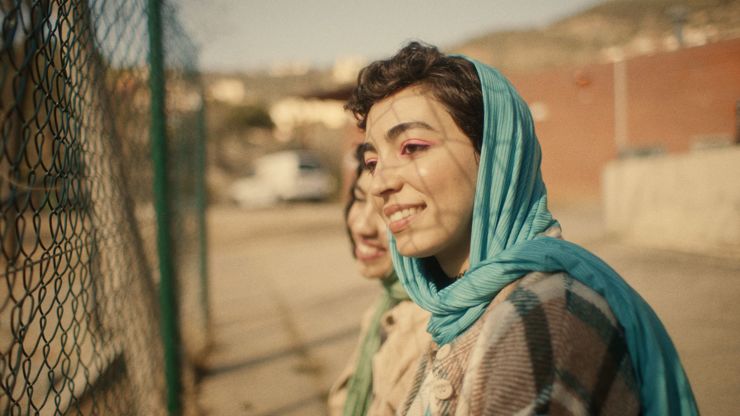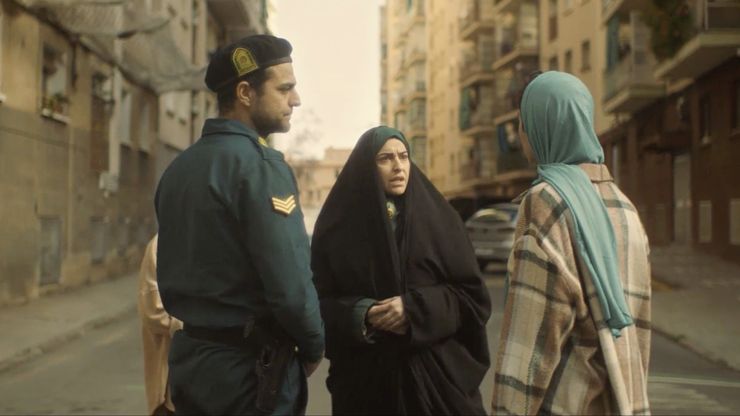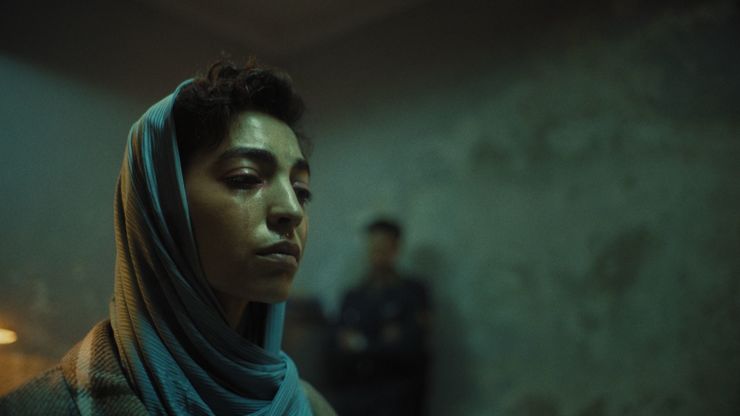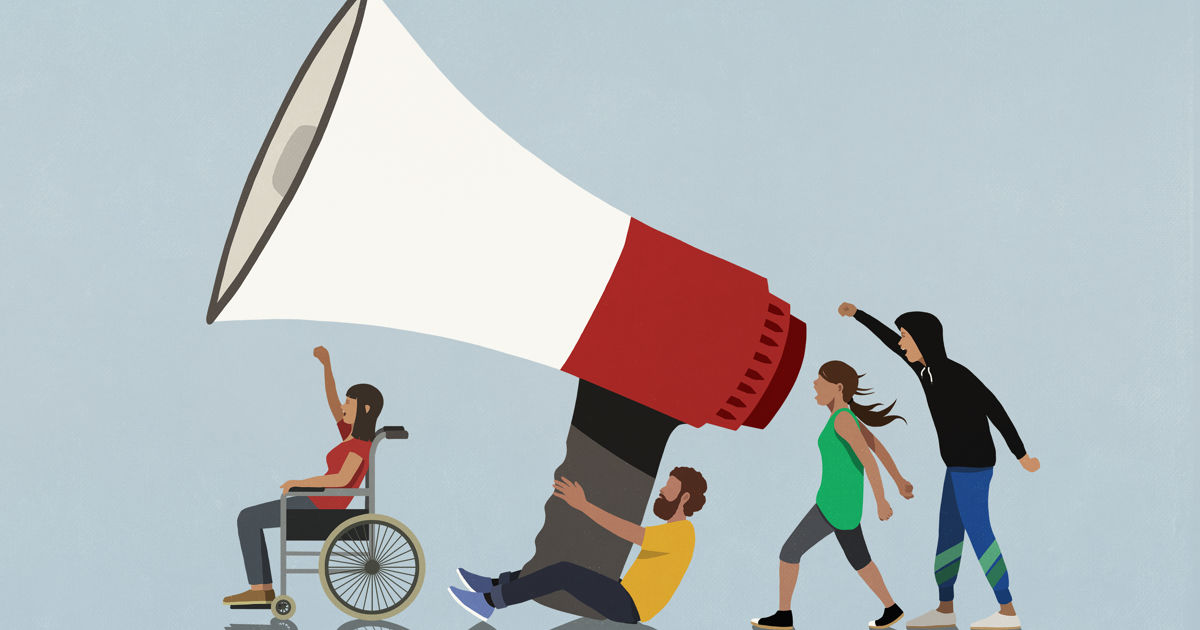When advertising becomes activism
Brand activism and purpose are tied at the hip these days, and the results can be spectacular – even more so when the risks are high. Here, Tim Cumming talks to risk-taking creatives in the UK, America and the Middle East about the power and perils of brand activism
When brands embrace a mission and a purpose above and beyond commercial survival, can they really change the world, or at least the conversation?
And what do they need to do to earn the right to be our guide in conversations about oppression, freedom, equality and the like?
What happens when a major brand enters the social activist space relies completely on their right to be there and why they’ve gone there in the first place.
Values have been part of branding’s bottom line for some time now. Inclusive, liberal values – the equalisers – rather than the dog-eat-dog ones. But do we really change our views and our habits on account of the stories a purpose-led brand tells us? Or is it more about wanting brands we buy to reflect back the better part of us? Not green or woke-washing as such, more confirmation bias.
For Rick Dodds at Don't Panic – whose founding principle is to provide a social or environmental benefit to clients, consumers and to the world, and to communicate deserving causes and the businesses and organisations that promote them – purpose-led advertising is the only game in town.
You can stand for something and still be funny, interesting, exciting; your stance will still count and connect.”"What happens when a major brand enters the social activist space relies completely on their right to be there and why they’ve gone there in the first place” he says. For Dodds, it’s consumers who police that space, who can spot lack of authenticity at 50 paces – because it matters to them. They want to see their best values reflected in their shopping basket.
“They’re filling their cupboards, their houses, their lives with brands that reflect their own values and qualities,” says Dodds. At the same time, the upward trajectory of brands engaging with activism shows no sign of levelling off. In fact, not engaging may be commercially unaffordable. “Brands recognise the importance of having a deeper relationship with their consumers,” says Dodds.
You can stand for something and still be funny, interesting, exciting; your stance will still count and connect.
“Take Nike. They were willing to take a hit with the now infamous Colin Kaepernick work, knowing it would alienate some of their consumers but also able to create a much deeper relationship with those who reflected the brands beliefs.” Big brands, he adds, are a huge voice in society, and those voices must be used for good, not just gain.
“Brands that have been born out of an ethical need or an ethical production method have an instant right to be there,” he adds. “As do brands with a rich history of standing up for social issues. But that doesn’t mean other brands can’t find a genuine way to enter the space and make a positive difference. The important part is how they do that authentically but also creatively. There seems to be a myth that purpose-driven work needs to be overtly sincere. You can stand for something and still be funny, interesting, exciting; your stance will still count and connect.”
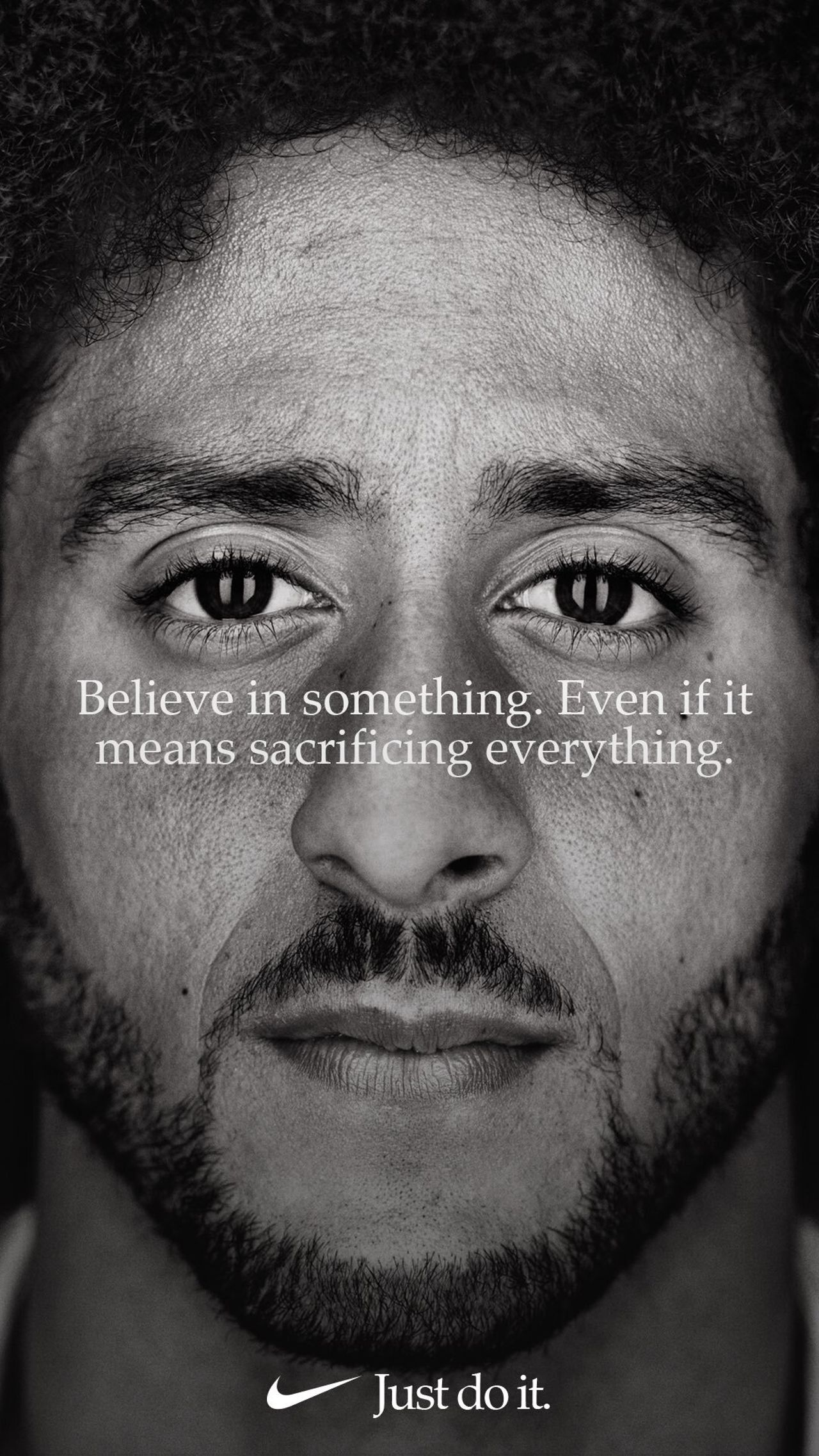
Above: Nike's campaign featuring Colin Kaepernick.
Like Don’t Panic, The Invisible Collective in the US is built on a deep and solid foundation of engagement and purpose. “We’re here to change the game,” reads their manifesto. “We’re invisible and we’re here to be seen.” Co-founder Stephen ‘Dr’ Love talks about the steep rise in brands that want to – or feel they must – join the conversation on movements like Black Lives Matter.
“The most important thing is for the issue to align with the brand,” says Love. “The audience now is way too smart to believe that every brand is about every issue, so it has to feel authentic with brand identity.”
Everything in politics, everything in advertising, stems back to what the intention was of the storyteller.
He points to a Proctor and Gamble spot he produced with The Corner Shop titled The Talk, as part of P&G’s Black is Beautiful campaign. “They wanted stand beside this conversation that we Black people and people of colour often have with our children,” says Love, “about how to move through society, how to climb the ranks of your career, the things you’ve got to go against as far as micro-aggressions and racism, and even police brutality, how to navigate that, and how unfortunate it is to have to have that talk with our babies.”
Credits
powered by
- Agency BBDO New York
- Production Company The Corner Shop
-
-
-
Unlock full credits and more with a Source + shots membership.
Credits
powered by
- Agency BBDO New York
- Production Company The Corner Shop
- Visual Effects The Mill New York
- Editing Company Work Editorial, New York
- Music Pulse Music New York
- Sound Design Trinite Studios
- Editor Rich Orrick
- Editor Theo Mercado
- Director of Photography Lasse Frank
- Art Director Michael Manson
- Art Director Bryan Barnes
- Copywriter Nedal Ahmed
- Executive Producer Dan Blaney
- Executive Producer Anna Hashmi
- Chief Creative Officer Greg Hahn
- Director Malik Vitthal
- Producer Blake Pickens
- Producer Stephen Love
- Creative Director Rick Williams
- Creative Director Marcel Yunes
- Production Designer
- Composers
- Production Supervisor Katie Taylor
- Senior Producer
- Senior Producer

Credits
powered by
- Agency BBDO New York
- Production Company The Corner Shop
- Visual Effects The Mill New York
- Editing Company Work Editorial, New York
- Music Pulse Music New York
- Sound Design Trinite Studios
- Editor Rich Orrick
- Editor Theo Mercado
- Director of Photography Lasse Frank
- Art Director Michael Manson
- Art Director Bryan Barnes
- Copywriter Nedal Ahmed
- Executive Producer Dan Blaney
- Executive Producer Anna Hashmi
- Chief Creative Officer Greg Hahn
- Director Malik Vitthal
- Producer Blake Pickens
- Producer Stephen Love
- Creative Director Rick Williams
- Creative Director Marcel Yunes
- Production Designer
- Composers
- Production Supervisor Katie Taylor
- Senior Producer
- Senior Producer
The Talk won the Grand Prix at Cannes because it was fully authentic – in front of camera, and behind. “It allowed the storytellers behind it, who are authentic to that audience, to really push the narrative, rather than placing the storytellers on choke hold.”
More recently, Love and Invisible Collective have been behind a new PSA, They Think They Know You, about Big Tobacco, and how brands don’t know as much as they think they do about you, however much they sift your data. “Sometimes we need to drive the conversation around what’s good for us and what’s not,” says Love of They Think They Know You, and it’s a subtle but thorough take-down of brands attempting to ‘understand’ who they’re selling to in order to sell more. The spot’s message, speaking directly to Black Americans in particular, is that we’re too complex and diverse to be predictable. We’re not a formula.
“When people talk about bravery in advertising, it makes me feel sick”
But Love is certain of one thing – that the power of story is the one ring that binds us. “With great storytelling comes great responsibility,” he says. “Because storytellers really change the world and change our minds and influence all of that. Storytellers rule the world, ultimately. Everything in politics, everything in advertising, stems back to what the intention was of the storyteller. I take it really seriously, our job as advertisers, as filmmakers, because we literally have influence over what people think. We’re not telling them what to think, but we are influencing what they think.”
Credits
powered by
- Agency C+C/Seattle
- Production Company Invisible Collective
- Director Justin Jeffers
-
-
Unlock full credits and more with a Source + shots membership.
Credits
powered by
- Agency C+C/Seattle
- Production Company Invisible Collective
- Director Justin Jeffers
- Ad Agency Neon/New York
- Director Justin Jeffers
- Director/Founder Justin Polk
- Director/Founder Mel Jones
- Founder Stephen Love Jr
- Executive Producer/Managing Director Tracie Norfleet
- Executive Producer / Creative Sam Kelly
- Executive Producer Kristen Hayle
- Executive Producer DeeSha Connor
- Owner Julie Colehour
- Account Services Michelle Karch
- Copywriter Jelani Curtis
- Creative Director Kevin Williams
- DP Jacob Rosen
- Editor Joanny Causse
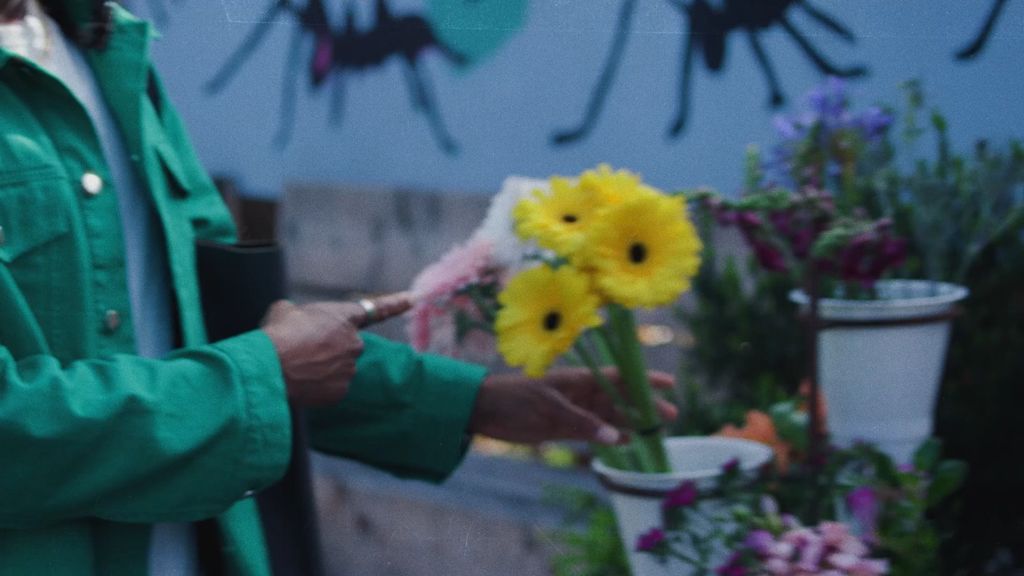
Credits
powered by
- Agency C+C/Seattle
- Production Company Invisible Collective
- Director Justin Jeffers
- Ad Agency Neon/New York
- Director Justin Jeffers
- Director/Founder Justin Polk
- Director/Founder Mel Jones
- Founder Stephen Love Jr
- Executive Producer/Managing Director Tracie Norfleet
- Executive Producer / Creative Sam Kelly
- Executive Producer Kristen Hayle
- Executive Producer DeeSha Connor
- Owner Julie Colehour
- Account Services Michelle Karch
- Copywriter Jelani Curtis
- Creative Director Kevin Williams
- DP Jacob Rosen
- Editor Joanny Causse
Anyone who has seen it will not forget the impact of the ten-minute film Rise, dedicated to the women and girls of Iran protesting the regime’s gender apartheid, and at great cost to themselves. September 16 was the first anniversary of the death of 22-year-old Kurdish Iranian Mahsa Amini, a university student who died in police custody while being detained for incorrectly wearing a hijab. Iranian officials deny reports she was beaten by police and claim she died of natural causes – her family say she was perfectly healthy.
Iran’s regime marked the anniversary of her death by introducing even stricter hijab and chastity laws.
"It’s shocking that the Mahsa Amini hashtag wasn’t picked up by brands."
Rise – now an Oscar and BIFA-qualifying short, was made by creatives who had to employ guerrilla tactics to film at all. When prepping one shoot, for example, their insurance was pulled at the last minute on account of the risk of Iranian retribution. Its director/writer goes under the pseudonym of Shirzan, a term that represents all of the Iranian female protestors, and means ‘lion woman’.
Rise is the filmic expression of the Woman, Life, Freedom movement, and in the wake of Amini’s murder, that slogan has spread across the globe to become the most hashtagged term ever. But for Shirzan, who must carefully protect their identity to avoid deadly exposure to the very long reach of the Iranian regime and its security services, “all Iranians involved in this project are basically exiling themselves to make art”.
Credits
powered by
-
- Production Company Evoca Foundation
- Director SHIRZAN
-
-
Unlock full credits and more with a Source + shots membership.
Credits
powered by
- Production Company Evoca Foundation
- Director SHIRZAN
- Post Production Absolute Post
- Music Pitch & Sync
- Executive Producer Naza Alakija
- DP Luke Jacobs / (DP)

Credits
powered by
- Production Company Evoca Foundation
- Director SHIRZAN
- Post Production Absolute Post
- Music Pitch & Sync
- Executive Producer Naza Alakija
- DP Luke Jacobs / (DP)
Shirzan can reveal nothing about herself, or her work, or even the incredible anonymous production company and anonymous producer that created Rise. And while she sees activist advertising as a positive force, she also sees where it runs out of road. Which is some way short, alas, of Women, Life, Freedom, however big the hashtag.
“When people talk about bravery in advertising, it makes me feel sick,” she exclaims at one point. “When I hear about brave work, I feel you guys do not understand what brave creativity is! We made Rise and we exiled ourselves. I wish the commercial world stop tooting its own horn and actually do something truly brave – and that would be to take on a Woman, Life, Freedom campaign and doing it proactively.”
"Suppression of the feminine affects everybody,” she says. “If we can start to lift that in countries where it is extreme, then we can start to shift it internally."
She, and the film’s star, actor Yasaman Mohsani still believe that brands can be brave and choose to step up to support their cause. What’s the barrier? Perhaps, they say, it is because of the ‘otherness’ of its origin, in the Middle East and Muslim worlds that are beyond the comfort zones of many globalised Western brands, and their consumers.
To protest the wearing of the hijab in Iran is a cry for freedom, but in the West, it may easily be seen as Islamophobia. “It’s not about rejecting Islam,” Mohsani counters. “It’s about rejecting the legislative gender apartheid that is put onto women in the Middle East, and the impact of that on women globally, and human beings globally. It’s shocking that the Mahsa Amini hashtag wasn’t picked up by brands,” she adds. “And the ones that could pick it up are the clothing brands, who make clothes for women – brands for which it’s not piggybacking off a movement and taking advantage, but actually supporting the empowerment of the feminine.”
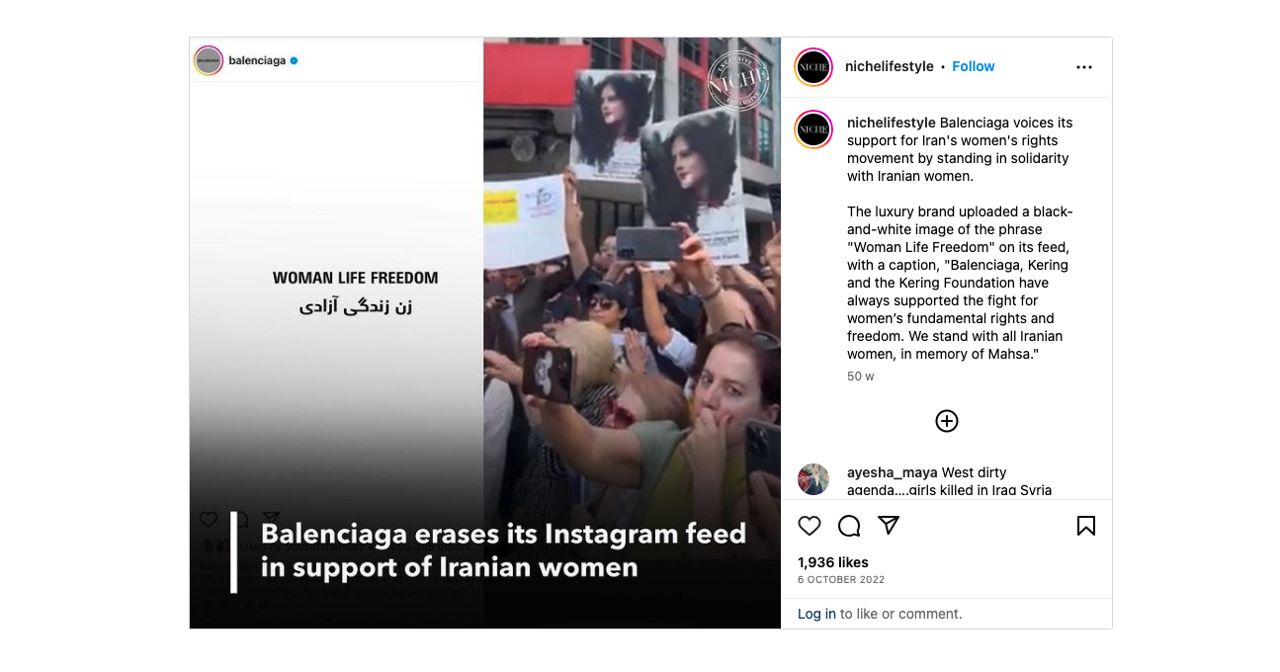
In support of women’s rights in Iran, last October Balenciaga wiped all its Instagram posts replacing it with a Women, Life, Freedom post in English and Farsi.
For Mohsani, the feminine principle is suppressed not only in regimes like Iran’s, but globally. She points to the UK’s high male suicide rates, and their cause, she believes, is the suppression of their feminine aspect – an openness to qualities such as emotional expression and vulnerability. “Suppression of the feminine affects everybody,” she says. “If we can start to lift that in countries where it is extreme, then we can start to shift it internally. Within our cultures, in the West too.”
For a brand to delete its entire social media history and have that one post was an incredible statement, and fashion is definitely the world we want to target
There is one striking brand engagement they point to. “Balenciaga deleted all its Instagram posts, and did its own single Women, Life, Freedom post in English and Farsi, and that was absolutely incredible,” says Shirzan. "For a brand to delete its entire social media history and have that one post was an incredible statement, and fashion is definitely the world we want to target", she adds.
Above: Stills from Rise.
“I’ve talked to agencies, begging them to approach fashion houses. But for some reason it’s not translating into action. I think it’s because of risk. Risk can bring you great rewards – you can get a huge profit from it – but sometimes you do lose money. In a brand context, true risk is when you’re doing something that is so punchy that it can go either way.”
Every company, every establishment needs to take risks. It has to move and be the progressive voice of our societies.
She points to the risk Nike took with its BLM campaign. “The kneeling of the sports stars and how contentious an issue it is inside of America, it was a brave move for them to do.” But it went the right way for Nike, and Shirzan and Mohsani are hoping that brands moves go the right way when it comes to aligning with Women, Life, Freedom.
“I think for any brand, company or individual, without risk there is no gain,” says Mohsani. “You’ll crumble and disintegrate. Every company, every establishment needs to take risks. It has to move and be the progressive voice of our societies. So now I hope brands can be that progressive voice for the feminine aspect, globally.”
)

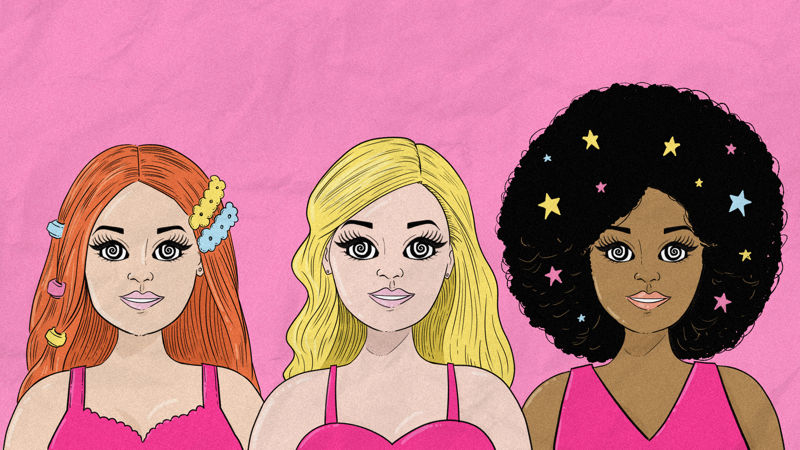


 + membership
+ membership








